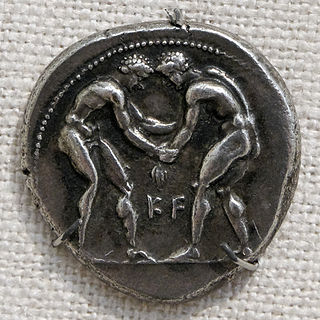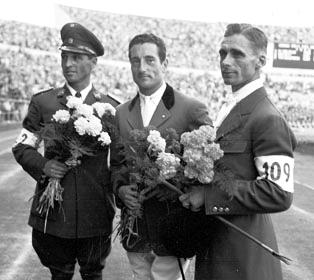Related Research Articles
Year 372 BC was a year of the pre-Julian Roman calendar. At the time, it was known as the Fourth year without Tribunate or Consulship. The denomination 372 BC for this year has been used since the early medieval period, when the Anno Domini calendar era became the prevalent method in Europe for naming years.

Elis or Eleia is an ancient district in Greece that corresponds to the modern regional unit of Elis.

The Panathenaic Games were held every four years in Athens in Ancient Greece from 566 BC to the 3rd century AD. These Games incorporated religious festival, ceremony, athletic competitions, and cultural events hosted within a stadium.

Olympia, officially Archaia Olympia, is a small town in Elis on the Peloponnese peninsula in Greece, famous for the nearby archaeological site of the same name. This site was a major Panhellenic religious sanctuary of ancient Greece, where the ancient Olympic Games were held every four years throughout Classical antiquity, from the 8th century BC to the 4th century AD. They were restored on a global basis in 1894 in honor of the ideal of peaceful international contention for excellence.

Portugal competed at the 2004 Summer Olympics in Athens, Greece, from 13 to 29 August 2004. Portuguese athletes have competed at every Summer Olympic Games in the modern era since 1912. The Olympic Committee of Portugal sent the nation's second-largest team to the Games. A total of 81 athletes, 64 men and 17 women, were selected by the committee to participate in 15 sports. Men's football was the only team-based sport in which Portugal had its representation at these Games. There was only a single competitor in badminton, canoeing, equestrian, artistic and trampoline gymnastics, triathlon, and wrestling, which made its official Olympic comeback after an eight-year absence.

Brazil competed at the 2004 Summer Olympics in Athens, Greece, from 13 to 29 August 2004. This was the nation's nineteenth appearance at the Summer Olympics, excluding the 1928 Summer Olympics in Amsterdam. The Brazilian Olympic Committee sent the nation's largest ever delegation in history to the Games. A total of 243 athletes, 124 men and 119 women, competed in 24 sports.
The Hellanodikai were the judges of the Ancient Olympic Games, and the success of the games was attributed to their efforts. It was their sacred duty to maintain the standards and legacy of the games, as well as uphold the rules.

Denmark competed at the 1956 Summer Olympics in Melbourne, Australia and Stockholm, Sweden. 31 competitors, 27 men and 4 women, took part in 25 events in 10 sports.

Belgium competed at the 1900 Summer Olympics in Paris, France. It was the first appearance of the European nation. Belgium was represented in France by 78 athletes, all of them male, who competed in 11 disciplines. They comprised 95 entries in 28 events.

Greek wrestling, also known as Ancient Greek wrestling and Pále (πάλη), was the most popular organized sport in Ancient Greece. A point was scored when one player touched the ground with his back, hip or shoulder, or conceding defeat due to a submission-hold or was forced out of the wrestling-area. Three points had to be scored to win the match.

Italy competed at the 1920 Summer Olympics in Antwerp, Belgium. 174 competitors, 173 men and 1 woman, took part in 79 events in 18 sports.

Athletes from the Netherlands competed at the 1924 Summer Olympics in Paris, France. 177 competitors, 168 men and 9 women, took part in 81 events in 17 sports.

Pierre Jonquères d'Oriola was a French equestrian who competed in show jumping. He is the only person to win two individual Olympic gold medals in this discipline.

The ancient Olympic Games were a series of athletic competitions among representatives of city-states and were one of the Panhellenic Games of Ancient Greece. They were held at the Panhellenic religious sanctuary of Olympia, in honor of Zeus, and the Greeks gave them a mythological origin. The originating Olympic Games are traditionally dated to 776 BC. The games were held every four years, or Olympiad, which became a unit of time in historical chronologies. They continued to be celebrated when Greece came under Roman rule in the 2nd century BC. Their last recorded celebration was in AD 393, under the emperor Theodosius I, but archaeological evidence indicates that some games were still held after this date. The games likely came to an end under Theodosius II, possibly in connection with a fire that burned down the temple of the Olympian Zeus during his reign.
Hypenus of Elis was an ancient Greek athlete from Elis who won the double race (Diaulos) of the 14th Ancient Olympic Games in 724 BC. It was the first time that the double race, i.e. a race with a distance of 2 stadia = 2 x 192 m, was run at the Olympic Games.

Sport pertains to any form of physical activity or game, often competitive and organized, that aims to use, maintain, or improve physical ability and skills while providing enjoyment to participants and, in some cases, entertainment to spectators. Sports can, through casual or organized participation, improve participants' physical health. Hundreds of sports exist, from those between single contestants, through to those with hundreds of simultaneous participants, either in teams or competing as individuals. In certain sports such as racing, many contestants may compete, simultaneously or consecutively, with one winner; in others, the contest is between two sides, each attempting to exceed the other. Some sports allow a "tie" or "draw", in which there is no single winner; others provide tie-breaking methods to ensure one winner. A number of contests may be arranged in a tournament producing a champion. Many sports leagues make an annual champion by arranging games in a regular sports season, followed in some cases by playoffs.

New Zealand competed at the 2012 Summer Olympics in London, from 27 July to 12 August 2012. This was the nation's twenty-fourth appearance at the Olympics. The New Zealand Olympic Committee sent 184 athletes, 97 men, and 87 women to the Games to compete in 16 sports, the nation's largest ever delegation.

Sweden competed at the 2012 Summer Olympics in London, from 25 July to 12 August 2012. Swedish athletes have competed at every edition of the Summer Olympic Games in the modern era, except for the 1904 Summer Olympics in St. Louis. The Swedish Olympic Committee sent a total of 134 athletes to the Games, 55 men and 79 women, to compete in 20 sports. For the second consecutive time in its Olympic history, Sweden was represented by more female than male athletes.

Zimbabwe competed at the 2016 Summer Olympics in Rio de Janeiro, Brazil, from 5 to 21 August 2016. This was the nation's tenth consecutive appearance at the Olympics, after gaining its independence from the former Rhodesia.

Mexico participated at the 2016 Summer Paralympics in Rio de Janeiro, Brazil, from 7 to 18 September 2016. The country sent a 71-member delegation to the Games.
References
- ↑ Bell, Sinclair W.; Jaser, Christian; Mann, Christian (2021-12-21). The Running Centaur: Horse-Racing in Global-Historical Perspective. Routledge. ISBN 978-1-000-52536-6.
